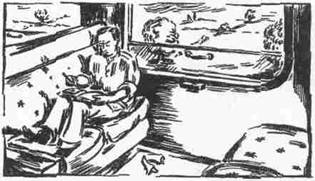STEP 22
Vocabulary
![]() Read and memorize these nouns and adjectives.
Read and memorize these nouns and adjectives.
Nouns
Body |
 |
Brain |
 |
Shirt |
 |
Toe |
 |
Trousers |
 |
Collar |
|
Current |
|
Fear |
|
Impulse |
|
Punishment |
|
Purpose |
|
Rule |
|
Adjectives
Hard - Soft
Structure words
Even
Tomorrow -Yesterday
Though
Structure
1 . Nouns
“Trousers” has only a plural form and is used as a plural even when only one garment is being talked about.
- I will take off these trousers because they are wet.
2 .Operators
Complex Tenses, etc
This step brings us to the final stage in mastering the operators. You know all the different forms of the operators and the auxiliaries, and you are familiar with the ways in which these are combined to form complex tenses and so on. The following example will remind you of the combinations that have been used in previous Steps and provide models for further combinations on the same lines, which will now present no difficulty.
- I have been putting my shirts in the drawer.
- He had a sudden fear that he had been saying something foolish.
- The shirts have been put in the drawer.
- I saw from their faces that something foolish had been said.
- His toes will be getting warm by the fire while he is waiting.
- He said that the committee would be having a discussion for some hours.
- She may be making his socks.
- I had an idea that she might be giving me a false account of these events.
- A small part of the brain will be taken out.
- He said that the new rules would be made by the committee.
- Holes may be made in one's socks quite quickly.
- They said that a more complete account might be given later.
- The boat will have gone before you get back.
- I would have made my purpose clear if you had given me a chance.
- The potatoes were soft, so she may have given them to the pigs.
- The plants might have come up more quickly if the earth had not been so hard.
- In another minute the boat will have been going in the same direction for an hour.
- He would have been getting a very different punishment if I had not said something to the manager.
- The noises in the street may have been keeping the baby awake.
- At the time when he might have been giving some help on the farm he was dong nothing.
- The boat will have been taken away by the current before you get back.
- A different punishment would have been given to the man if I had not said something to the manager.
- The baby may have been kept awake by the noises in the street.
- She said that help might have been given earlier if you had sent a letter to her friend.
- The rules seem to have been made by a very foolish person.
- He seemed to have had the same impulse before.
- To have seen these things is to have had an education.
- Having had a drink, he went to bed.
As will be seen from the above examples, to followed by an operator is replaced by to have followed by the form of the operator used with this auxiliary (to have done, etc.), when referring to an act completed before the time indicated by the main statements. “Having done”, etc., similarly replaces doing etc.
In all complex tenses, the position of not is after the first auxiliary. Similarly, questions are formed by changing the order of the subject and the first auxiliary.
- He said that the committee would not be having a discussion then.
- The boat will not have gone before you get back.
- The baby may not have been kept awake by the noises in the street.
- Has he been putting his shirts in the drawer?
- May she be making his socks?
- Will the boat have been taken away by the current before I get back?
- May he not have taken all the soft collars with him?
- Has the purpose of the punishment not (or hasn't the purpose of the punishment) been made clear to the boys?
Three new constructions complete our survey of the operator system.
When talking of something as intended or expected, especially in the near future, we frequently use some tense of “be” followed by “going” before “to” and the root form of an operator. (The underlying idea is that by arrangement, or intention, or force of circumstances, the first step to the performance of the act, etc., has been taken - we are already 'on the way to' something we are going to do, etc.)
- I am going to put on a white collar this morning.
- He says that he is going to make a protest.
- She said that she was going to give the old woman a softer cushion.
- There is going to be rain today.
- She is going to get a surprise when she sees this.
- It is going to be warm tomorrow.
- The man was going to be put in prison, but he got away.
- I have been going to put that question for a long time.
To indicate necessity or compulsion, we use the operator have followed by to and an operator.
- Something has to get the water from the river.
- I had to give the boys a punishment.
- He will have to have some new trousers.
- The work has to be done today.
- There will have to be a meeting of the committee.
Observe the difference between these two constructions:
- I have work to do. (There is work to be done by me.)
- I have to do work. (I must do work.)
To indicate that something is destined, planned, or commanded to take place, we use the operator “be” followed by “to” and an operator
- This decision was to be the start of great changes in education.
- The houses are to be ready tomorrow.
- Your punishment is that you are to go to be dearly.
3 . Adverbs
The adverbs of time “yesterday” and “tomorrow” form a group with the compound word today. Like “today”, they may be used as nouns.
- My brain was clearer yesterday than it is today.
- Yesterday was our last day in the country.
- They may make a new rule tomorrow.
- Tomorrow never comes.
“Even” is used to emphasize something as being extreme or as remarkable in going beyond what might be expected. It may qualify as statement, as operator, a noun, an adjective, or an adverb, and, like only, it always comes before whatever it qualifies.
- This is a bad picture, but that is even worse. (remarkable though it is that anything could be worse)
- He made her do all the work and sometimes he even gave her blows.
- The girl did not even see him yesterday.
- Even his fear of punishment did not keep him from taking the money.
- She was young and even beautiful but she had no men friends.
- The protest was made loudly and even violently.
- His mother was at his side even before he gave a cry for help.
- Even if you put me in prison, I will not say where my friends are.
- Even a good judge of horses may sometimes be wrong.
“Not even” with an affirmative operator may replace even with a negative operator.
- Not even his fear of punishment kept him from taking the money.
Suitable adverbs of manner (including “well”) may qualify adjectives, and are, for this purpose, put before them.
- This collar is completely different.
- This made my father violently angry.
- The shirts are well made.
4 . Conjunctions
“Though” introduces a dependent statement putting forward some fact opposed to the fact given by the main statement, but in spite of which the main statement is true.
- My brain is tired though my body is not.
- Though she had an impulse to get up and go out of the room, she kept her seat.
Exercises

1. Write a description in Basic of what you see in the picture, bringing in as many new words as possible.
A:
2. Put the right tense of the operator in the following sentences. The root form of the first auxiliary and the operator are given in brackets.
(a) He (will, have) an impulse to take the money if no one had been in the room.
A:
(b) He had a fear that his old shirts (may, give) to someone when he was away.
A:
(c) When I see my sister tomorrow she (will, get) the letter I sent to her yesterday.
A:
(d) Do not come at the same time tomorrow because we (will, have) our meal then.
A:
(e) They said that the ship (may, go) in the wrong direction when it went down.
A:
(f) If the boxes had been read they (will, take) yesterday.
A:
3. Change the following sentences into questions, giving the contracted and the uncontracted form in the case of negatives:
(a) She might have had more fear if her baby had been with her.
A:
(b) The animal had not been going against the current.
A:
(c) I He may have been getting a knowledge of the language.
A:
(d) I would not have seen the trousers even if they had been on the bed.
A:
(e) The work which he is doing has been making his brain tired.
A:
(f) Help would not have been given to him for such a purpose if he had gone to the committee.
A:
4. Complete these sentences by putting even, only, but, though, or if into the blanks :
(a) The smoke still comes out ______ some paper has been put into the hole.
A:
(b) They were unable to see through the mist ___ they got the ship into the harbor.
A:
(c) ____ this small print is quite clear.
A:
(d) She would not have taken an umbrella ____ ____ the weather had been wet.
A:
(e) _____ they were not able to see through the mist they got the ship into the harbor.
A:
(f) _____ the knowledge that acid fruit is bad for the digestion kept her from taking more.
A:
(g) No one will go on the grass ____ you put a rail round it.
A:
(h) _____ the knowledge that acid fruit would give her a pain did not keep her from taking more.
A:
(i) He said nothing about this idea ____ to his dearest friends.
A:
(j) The decision was made ____ after a long discussion.
A:
5. Make the following into sentences:
(a) Might be given
A:
(b) Will have been said
A:
(c) Might have been made
A:
(d) Had been put
A:
(e) May have been seen
A:
(f) Seems to have been done
A:




